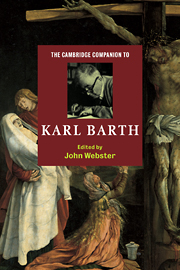Book contents
- Frontmatter
- 1 Introducing Barth
- 2 Theology
- 3 Revelation
- 4 The Bible
- 5 The Trinity
- 6 Grace and being
- 7 Creation and providence
- 8 Karl Barth’s Christology
- 9 Salvation
- 10 The humanity of the human person in Karl Barth’s anthropology
- 11 The mediator of communion
- 12 Christian community, baptism, and Lord’s Supper
- 13 Barth’s trinitarian ethic
- 14 Karl Barth and politics
- 15 Religion and the religions
- 16 Barth and feminism
- 17 Barth, modernity, and postmodernity
- 18 Karl Barth
- Index
4 - The Bible
Published online by Cambridge University Press: 28 May 2006
- Frontmatter
- 1 Introducing Barth
- 2 Theology
- 3 Revelation
- 4 The Bible
- 5 The Trinity
- 6 Grace and being
- 7 Creation and providence
- 8 Karl Barth’s Christology
- 9 Salvation
- 10 The humanity of the human person in Karl Barth’s anthropology
- 11 The mediator of communion
- 12 Christian community, baptism, and Lord’s Supper
- 13 Barth’s trinitarian ethic
- 14 Karl Barth and politics
- 15 Religion and the religions
- 16 Barth and feminism
- 17 Barth, modernity, and postmodernity
- 18 Karl Barth
- Index
Summary
From beginning to end, Barth's Church Dogmatics is nothing other than a sustained meditation on the texts of Holy Scripture, in all the richness and diversity with which these texts elaborate their single theme: a divine-human action constitutive both of divine and of human being, a particular action that is nevertheless all-inclusive in its scope. There are, of course, many parts of the Church Dogmatics that practise an 'explicit' biblical interpretation or hermeneutics: from passing references to particular verses to extended expositions of whole chapters or books, from consideration of particular concepts such as 'witness' or 'saga' (or 'legend'), to the construction of what might be called an 'ontology' of Holy Scripture. This material can be roughly differentiated from other material where the biblical texts appear to be in the background, or are perhaps absent altogether. Yet to regard biblical interpretation as just one among a number of items on Barth's agenda would be to allow the seamless garment of his theology to be torn to pieces.
- Type
- Chapter
- Information
- The Cambridge Companion to Karl Barth , pp. 57 - 71Publisher: Cambridge University PressPrint publication year: 2000
- 4
- Cited by

